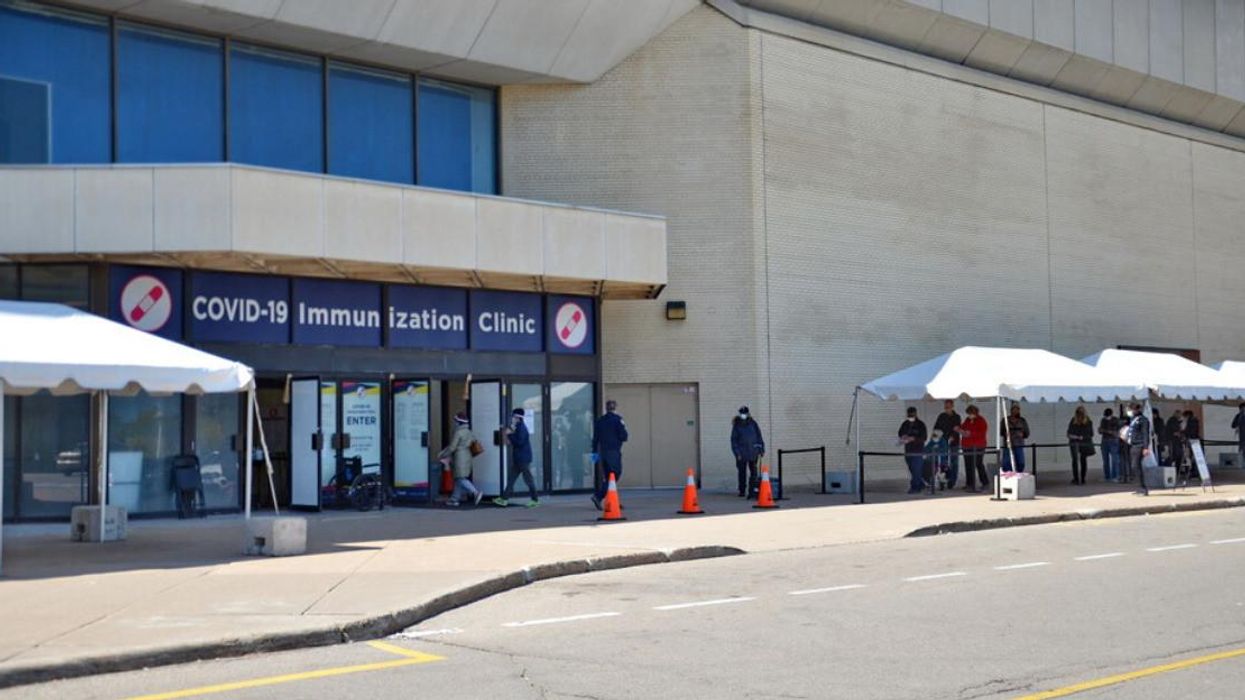Your Easy Guide To COVID-19 Vaccines In Ontario & How Many Doses You Should Have
So many steps it's getting confusing.

A lineup outside of a Covid-19 vaccine clinic in Toronto, Canada.
At this point in the pandemic, there are so many options and steps to getting your complete set of COVID-19 vaccines that it's starting to get a bit overwhelming.
To give you a hand, we've made a new and easy guide to getting vaccinated in Ontario, based on guidance from Public Heath Ontario. No matter where in the process you might be right now, you can get back on the path.
The Primary Shots
This is the first step that began all the way back in the spring of 2021.
The primary series of vaccines consists of two (or three if immunocompromised) doses to be given eight weeks apart. Anyone six months and older is eligible to receive these in the province.
The main mRNA vaccines in use in Ontario have been made by Pfizer and Moderna. Another protein-based vaccine has been made by Novavax and is available to anyone over the age of 18 or anyone allergic to mRNA vaccines.
These vaccines are only the beginning of the vaccination process as they help people develop a strong initial immune response. In order to be considered "fully vaccinated," most people require at least two doses.
The Booster Doses
Several months after completing your primary series of COVID-19 vaccines, you are eligible for your first booster doses.
Anyone over the age of five can "receive a first booster dose at a recommended interval of six months or a minimum of three months since their last dose." Adults can get a second booster shot after waiting that same interval, but that dose hasn't been approved for children yet.
Tiny humans of age five and under are not currently eligible for a booster shot.
The Bivalent Vaccine
The Bivalent vaccine is the newest option that's been made available to people in Ontario and across Canada.
Pfizer's version is an update of its mRNA vaccine, which "targets the original COVID-19 virus and the Omicron variant, which is currently the dominant variant in circulation in Ontario."
It can currently be administered to everyone over the age of 18 as a booster dose, as they "help restore protection that has decreased since previous vaccination." In the case of individuals at high risk for severe COVID-19 illness, it is strongly recommended, after discussing with your healt care provider, to get the bivalent vaccine ahead of the "respiratory season," in order to ensure optimal protection.
Of course, the same recommended intervals as other booster doses apply.
What if I've had Covid-19?
Health officials still recommend getting vaccinated even if you've contracted Covid-19 at some point during the pandemic, since your immunity decreases over time and the virus mutates, meaning that you could still get infected and spread the virus among your community.
If you're completing your primary series of vaccines and get the virus, the province recommends that you wait at least one month before getting your next vaccine dose. Their recommendation extends to at least three months if you're in-between booster shots.
Health Canada has a robust website with all the latest information on COVID-19 vaccines and can answer any questions you may have.
This article's cover image was used for illustrative purposes only.
- Covid 19 Ontario - Narcity ›
- Ontarians Over The Age Of 5 Are Eligible For Their Bivalent Booster & Here's When To Book - Narcity ›